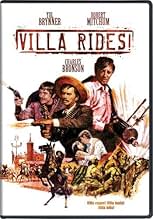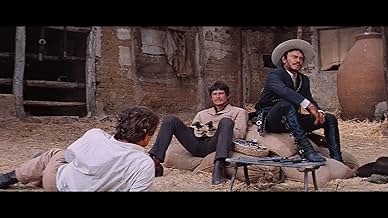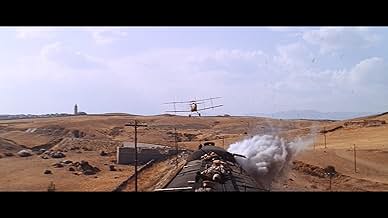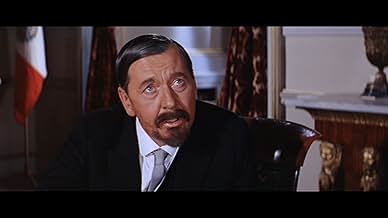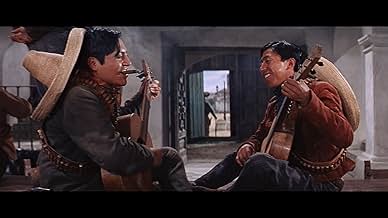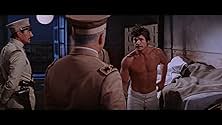NOTE IMDb
6,3/10
2,5 k
MA NOTE
Le rebelle mexicain Pancho Villa mène une révolution avec l'aide d'un aviateur américain emprisonné au Mexique.Le rebelle mexicain Pancho Villa mène une révolution avec l'aide d'un aviateur américain emprisonné au Mexique.Le rebelle mexicain Pancho Villa mène une révolution avec l'aide d'un aviateur américain emprisonné au Mexique.
- Réalisation
- Scénario
- Casting principal
Maria Grazia Buccella
- Fina
- (as Grazia Buccella)
Robert Carricart
- Don Luis
- (as Bob Carricart)
Andrés Monreal
- Capt. Herrera
- (as Andres Monreal)
José María Prada
- Major
- (as Jose Maria Prada)
Regina de Julián
- Lupita
- (as Regina de Julian)
Antoñito Ruiz
- Juan
- (as Antonio Ruiz)
Francisco Arduras
- Villista
- (non crédité)
Avis à la une
"Villa Rides" is the tale of the legendary Pancho Villa, key player in the Mexican Revolution who was a bandit, to be sure, but also undeniably a true leader deeply committed to his cause. However, the tale mostly focuses on Lee Arnold (Robert Mitchum), the American pilot who is captured by Villa's forces and eventually, reluctantly becomes caught up in their mission. Yul Brynner, sporting a full head of hair for once, is thought by some to be miscast as Villa, but in any event this reviewer does feel that his screen presence is still powerful. Mitchum, admittedly, isn't at his best and in fact looks rather disinterested throughout this thing, which is not good considering how much screen time is given to his character. Herbert Lom does well in the key role of a dubious Mexican general, and Maria Grazia Buccella is appealing and lovely in the underwritten role of Lee's love interest. The performer here who truly stands out is Charles Bronson, sporting his familiar moustache for the first time here, as Villa's associate Fierro, and the actor does capture this person's essential ruthlessness, although in real life Fierro was supposed to be an even more bloodthirsty individual. Also appearing are Bronson's wife Jill Ireland, in the first of the films that they did together, although she doesn't show up until near the end, as well as Robert Viharo, Frank Wolff, Alexander Knox, Fernando Rey, and John Ireland in a brief, uncredited bit. The screenplay is courtesy of Robert Towne and Sam Peckinpah, but it never really gives us much insight into Villa. There are some great moments of well staged action, but overall the pacing is a little sluggish. TV veteran Buzz Kuliks' direction is basically competent, although one has to wonder what might have been had Peckinpah been allowed to direct his own original screenplay, which wouldn't have romanticized Villa quite so much. Undeniably effective is the photography of some beautiful scenery and Maurice Jarres' eclectic score. This film does have its moments, such as Lee lobbing bombs as he flies his plane, but it could and should have been more interesting. As it is, it's decent entertainment but it doesn't ever quite take off. Six out of 10.
"Villa Rides" says in the opening credits that it is a tribute to Pancho Villa. And, as presented, the film is indeed a tribute in which it paints the former Mexican bandit in pretty colors. We should remember that the Mexican revolutionary had attacked an American town, Columbus, New Mexico. So, the U.S. government sent our own Gen. John J. Pershing into Mexico to hunt down and capture or kill Francisco "Pancho" Villa. His pursuit lasted from March 1916 to February 1917. Pershing was recalled when WW I broke out. Of course, none of this is mentioned in this film.
So, remembering that Hollywood often glosses over history – even rewrites it at times, viewers should always take films like this with a grain of salt – as to their accuracy and truth. Of course, their enjoyment as entertainment is aside from that. Now, to counter that aspect, we should also remember that Villa was a real folk hero among the people. He was a Mexican "Robin Hood," who stole from the rich and gave to the poor. He wasn't out for power himself, but was a genuine revolutionary for the freedom of the people.
We should also remember that it was after 1917 that the dictatorships in Mexico began to oppress the church and religion. Recent Mexican President Vicente Fox acknowledged and lamented the previous tyrannical governments. After 1917, Mexico outlawed religion, killed priests, confiscated and closed churches, and desecrated altars. Not until 1992 did this situation begin to change. Can it be any wonder why so many Mexicans would flee their country and want to live in the U.S. in the 20th century? Besides the economic hardships, the people were terribly persecuted and denied their basic rights.
Now for this film. It has a nice plot with some good action. The cast, for the most part, are quite good. Yul Bryner is very good as Pancho, although I suspect he is quite sanitized. Charles Bronson is very good as Fierro. Some other main characters are all quite good – Fernando Rey as Fuentes, Alexander Knox as Madero, and Herbert Lom as General Huerta. You'll notice I've saved Robert Mitchum until last. His role just doesn't fit as he portrays it. We need the character for the plot, but Mitchum just does not seem to play him right. He seems way too nonchalant. The script, or directing, or acting, or all three needed a major rework there to make his character much more believable. It put a sort of pale of humor over the story, and I don't think it really should be humorous. Not when we see families distraught over the hanging of many of their fathers, husbands and sons by the government army. And, I've never thought it funny when women are raped.
So, I'll give this 7 stars for the action, the story and the roles of Bryner, Bronson and some others. Back to that opening credit on the film – I'm sure that Paramount didn't mean to imply that Hollywood welcomes foreign governments to attack towns in the U.S. Or that it will honor them for doing so. But, wait a minute. I could be wrong about Hollywood.
So, remembering that Hollywood often glosses over history – even rewrites it at times, viewers should always take films like this with a grain of salt – as to their accuracy and truth. Of course, their enjoyment as entertainment is aside from that. Now, to counter that aspect, we should also remember that Villa was a real folk hero among the people. He was a Mexican "Robin Hood," who stole from the rich and gave to the poor. He wasn't out for power himself, but was a genuine revolutionary for the freedom of the people.
We should also remember that it was after 1917 that the dictatorships in Mexico began to oppress the church and religion. Recent Mexican President Vicente Fox acknowledged and lamented the previous tyrannical governments. After 1917, Mexico outlawed religion, killed priests, confiscated and closed churches, and desecrated altars. Not until 1992 did this situation begin to change. Can it be any wonder why so many Mexicans would flee their country and want to live in the U.S. in the 20th century? Besides the economic hardships, the people were terribly persecuted and denied their basic rights.
Now for this film. It has a nice plot with some good action. The cast, for the most part, are quite good. Yul Bryner is very good as Pancho, although I suspect he is quite sanitized. Charles Bronson is very good as Fierro. Some other main characters are all quite good – Fernando Rey as Fuentes, Alexander Knox as Madero, and Herbert Lom as General Huerta. You'll notice I've saved Robert Mitchum until last. His role just doesn't fit as he portrays it. We need the character for the plot, but Mitchum just does not seem to play him right. He seems way too nonchalant. The script, or directing, or acting, or all three needed a major rework there to make his character much more believable. It put a sort of pale of humor over the story, and I don't think it really should be humorous. Not when we see families distraught over the hanging of many of their fathers, husbands and sons by the government army. And, I've never thought it funny when women are raped.
So, I'll give this 7 stars for the action, the story and the roles of Bryner, Bronson and some others. Back to that opening credit on the film – I'm sure that Paramount didn't mean to imply that Hollywood welcomes foreign governments to attack towns in the U.S. Or that it will honor them for doing so. But, wait a minute. I could be wrong about Hollywood.
So far I haven't seen one film about Pancho Villa that got it right and Villa Rides is definitely one of them. Perhaps the proposed biographical film that Johnny Depp will star in might do Villa some justice.
Yul Brynner and Robert Mitchum co-star in Villa Rides with Brynner in the title role. Mitchum plays your typical soldier of fortune although in his case he's a pilot of fortune. He's a pilot of one of those new fangled airplanes and it is through his eyes we see the story of the film unfold.
A damaged aircraft delays Mitchum in Mexico after making a delivery and before he knows it, he's hip deep in the revolution that is going on in Mexico. At this point in his career Villa is one of several guerrilla chiefs supporting the new republic and the presidency of the idealistic Francisco Madero played here by Alexander Knox. Madero himself was a strange and fascinating character, one day he might get a biographical film study of his tragic life.
The Mexican Revolution of the teen years saw the country give way to anarchy with Villa eventually becoming one of several generalissimos controlling a piece of Mexican turf. As Villa operated in the extreme north of the country it was his bad fortune to later on raid into the USA and get Woodrow Wilson to send our army after him.
Here at the beginning Villa though after Mitchum talks his way into not being shot by his forces, Brynner sees the value of Mitchum's airplane as a weapon of war. He puts one of his aides Charles Bronson to ride herd on Mitchum and the two of them don't get along at all.
According to Lee Server's book on Mitchum they didn't get along all that well during the filming. Another Mitchum, brother John Mitchum wrote in his memoirs that Bronson was a very reserved sort who guarded his privacy strictly. They apparently had no problem on the set of Bronson's film Breakheart Pass which John Mitchum had a small part.
Mitchum and Brynner got along however which was not always the case with Brynner. Yul Brynner was a man of some mystery who liked it that way, he was and could be standoffish with fellow players, but apparently he and Mitchum worked well together in their only joint film.
The film was shot in Spain and I have to say the battle sequences were very well staged. They are the best part of Villa Rides.
A good, but not a great film. I do have to wonder that when Black Jack Pershing came into Mexico later on after the action of this film concluded, might not Mitchum be in a real jackpot fighting against the American army at that point.
Yul Brynner and Robert Mitchum co-star in Villa Rides with Brynner in the title role. Mitchum plays your typical soldier of fortune although in his case he's a pilot of fortune. He's a pilot of one of those new fangled airplanes and it is through his eyes we see the story of the film unfold.
A damaged aircraft delays Mitchum in Mexico after making a delivery and before he knows it, he's hip deep in the revolution that is going on in Mexico. At this point in his career Villa is one of several guerrilla chiefs supporting the new republic and the presidency of the idealistic Francisco Madero played here by Alexander Knox. Madero himself was a strange and fascinating character, one day he might get a biographical film study of his tragic life.
The Mexican Revolution of the teen years saw the country give way to anarchy with Villa eventually becoming one of several generalissimos controlling a piece of Mexican turf. As Villa operated in the extreme north of the country it was his bad fortune to later on raid into the USA and get Woodrow Wilson to send our army after him.
Here at the beginning Villa though after Mitchum talks his way into not being shot by his forces, Brynner sees the value of Mitchum's airplane as a weapon of war. He puts one of his aides Charles Bronson to ride herd on Mitchum and the two of them don't get along at all.
According to Lee Server's book on Mitchum they didn't get along all that well during the filming. Another Mitchum, brother John Mitchum wrote in his memoirs that Bronson was a very reserved sort who guarded his privacy strictly. They apparently had no problem on the set of Bronson's film Breakheart Pass which John Mitchum had a small part.
Mitchum and Brynner got along however which was not always the case with Brynner. Yul Brynner was a man of some mystery who liked it that way, he was and could be standoffish with fellow players, but apparently he and Mitchum worked well together in their only joint film.
The film was shot in Spain and I have to say the battle sequences were very well staged. They are the best part of Villa Rides.
A good, but not a great film. I do have to wonder that when Black Jack Pershing came into Mexico later on after the action of this film concluded, might not Mitchum be in a real jackpot fighting against the American army at that point.
Released in 1968, "Villa Rides" stars Robert Mitchum as a Texas pilot/gunrunner who is thrust into the Mexican Revolution by his own greed. After being disillusioned by the Colorados (Orozquistas), he hooks up with bandit-turned-nationalist Pancho Villa (Yul Brynner) & his hardened patriots to face off against the Colorados in Northern Mexico. Charles Bronson and Robert Viharo play Villa's grim and merry assistants respectively while Maria Grazia Buccella is on hand as a woman that strikes the pilot's fancy. Herbert Lom appears as an enemy general while Alexander Knox plays naïve President Madero. Jill Ireland has a small role at the end.
Sam Peckinpah wrote the original screenplay and was slated to direct, but Brynner felt the script made Villa out to be too harsh, so Yul used his pull to get Robert Towne to rewrite it and the producers pursued another director, ending up with Buzz Kulik.
While this is more historical fiction than reality, it does successfully bring you back in time to the Mexican Revolution and helps you envision what it must have been like to ride with the legendary Villa. The movie definitely has more credibility than the incongruously-toned "Pancho Villa" (1972) with Telly Savalas in the titular role (although that Western is worth catching just for Villa's "invasion" of America with his raid on Columbus, New Mexico, a town three miles from the border, on March 9, 1916). The first half of "Villa Rides" is a decent Western, but the action-packed second half starts to go off the rails, as far as sustaining the viewer's interest. The filmmakers obviously needed to take more time to work the kinks out and draw forth the film's potential.
The movie runs 122 minutes and was shot in Guadalajara, Castilla-La Mancha & Madrid, Spain and Mexico (Chihuahua, Sonora & Guanajuato City).
GRADE: Borderline C+/B-
Sam Peckinpah wrote the original screenplay and was slated to direct, but Brynner felt the script made Villa out to be too harsh, so Yul used his pull to get Robert Towne to rewrite it and the producers pursued another director, ending up with Buzz Kulik.
While this is more historical fiction than reality, it does successfully bring you back in time to the Mexican Revolution and helps you envision what it must have been like to ride with the legendary Villa. The movie definitely has more credibility than the incongruously-toned "Pancho Villa" (1972) with Telly Savalas in the titular role (although that Western is worth catching just for Villa's "invasion" of America with his raid on Columbus, New Mexico, a town three miles from the border, on March 9, 1916). The first half of "Villa Rides" is a decent Western, but the action-packed second half starts to go off the rails, as far as sustaining the viewer's interest. The filmmakers obviously needed to take more time to work the kinks out and draw forth the film's potential.
The movie runs 122 minutes and was shot in Guadalajara, Castilla-La Mancha & Madrid, Spain and Mexico (Chihuahua, Sonora & Guanajuato City).
GRADE: Borderline C+/B-
"Villa Rides" is the most accurate film depicting the life of the infamous mexican bandit, Pancho Villa. It's also filled with an all-star cast. Yul Brenner plays Villa to perfection (many other actors including Telly Savalas have played the role, but not as good as Brenner). Charles Bronson is equally good as Villa's sidekick who spends his free time humiliating and shooting mexicans. Robert Mitchum plays a pilot who gets involved in Villa's revolution. There is a constant pace of action and good dialogue ("Go outside and die. Where are your manners?" is what Bronson says to a mexican after the mexican tries to force himself on a young girl. Bronson shoots him and kicks him out the door). The buzzing noise Mitchum's airplane makes becomes annoying throughout the film (the director's name is Buzz) and the actor who plays the mexican villain seems to be more of a Woody Allen-type character than a vicious, sadistic tyrant. He makes up for that in his final scene. Classic stuff! The film is very rare and hard to find. If you get it, you're lucky.
Le saviez-vous
- AnecdotesAccording to producer Norbert Saada's interview in the documentary "Once Upon A Time Sergio Leone", Italian director Sergio Leone was offered to direct, but turned it down because he did not like the casting of Yul Brynner in the title role.
- GaffesNear the end of the movie they show a street scene that is supposed to be El Paso Texas but on the side of a building it advertises the Oklahoma Wigwam the newspaper from the book and movie Cimarron.
- Citations
[repeated lines]
Rodolfo Fierro: Who cooked this?
Ramirez: Me, Jefe.
Rodolfo Fierro: No, you didn't!
Ramirez: No, I didn't.
Rodolfo Fierro: COOK IT!
- ConnexionsFeatured in Kain's Quest: The Stone Killer (2015)
Meilleurs choix
Connectez-vous pour évaluer et suivre la liste de favoris afin de recevoir des recommandations personnalisées
- How long is Villa Rides?Alimenté par Alexa
Détails
Box-office
- Montant brut aux États-Unis et au Canada
- 2 640 000 $US
Contribuer à cette page
Suggérer une modification ou ajouter du contenu manquant

Lacune principale
By what name was Pancho Villa (1968) officially released in India in English?
Répondre

